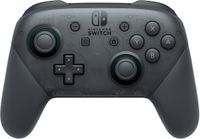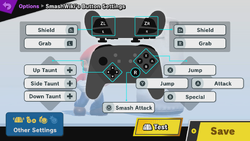| Welcome to SmashWiki! Log in or create an account and join the community, and don't forget to read this first! |
| Notices |
|---|
| The Skill parameter has been removed from Smasher infoboxes, and in its place are the new "Best historical ranking" and "Best tournament result" parameters. SmashWiki needs help adding these new parameters to Smasher infoboxes, refer to the guidelines here for what should be included in these new parameters. |
| When adding results to Smasher pages, include each tournament's entrant number in addition to the player's placement, and use the {{Trn}} template with the matching game specified. Please also fix old results on Smasher pages that do not abide to this standard. Refer to our Smasher article guidelines to see how results tables should be formatted. |
| Check out our project page for ongoing projects that SmashWiki needs help with. |
Nintendo Switch Pro Controller: Difference between revisions
m (Consistent formatting) |
|||
| Line 8: | Line 8: | ||
==Compatibility== | ==Compatibility== | ||
The Switch Pro Controller is currently only compatible with the [[Nintendo Switch]] with currently no confirmation on if they will be made forwards compatible with future consoles. That being said, its bluetooth connectivity allows it to connect to other devices and | The Switch Pro Controller is currently only compatible with the [[Nintendo Switch]] with currently no confirmation on if they will be made forwards compatible with future consoles. That being said, its bluetooth connectivity allows it to connect to other devices and unofficially be used as a controller for compatible games, though additional drivers may need to be installed for a smooth experience. | ||
In ''Ultimate'', the buttons on the Pro Controller can be remapped in the [[Controls]] menu to perform other functions. As of Nintendo Switch hardware version 10.0.0, every button on the Pro Controller can be remapped via the system's settings, further diversifying its customizability. | In ''Ultimate'', the buttons on the Pro Controller can be remapped in the [[Controls]] menu to perform other functions. As of Nintendo Switch hardware version 10.0.0, every button on the Pro Controller can be remapped via the system's settings, further diversifying its customizability. | ||
==Standard | ==Standard controls== | ||
[[File:DefaultProSSBU.png|thumb|right|250px|Nintendo Switch Pro Controller controls menu in ''Ultimate''.]] | [[File:DefaultProSSBU.png|thumb|right|250px|Nintendo Switch Pro Controller controls menu in ''Ultimate''.]] | ||
{|class="wikitable" style="text-align:center" | {|class="wikitable" style="text-align:center" | ||
| Line 24: | Line 24: | ||
|R{{Button|Switch|Control Stick|s=25px}}||[[Smash attack|Stick-smash]] | |R{{Button|Switch|Control Stick|s=25px}}||[[Smash attack|Stick-smash]] | ||
|- | |- | ||
|{{Button|Switch|X|s=25px}}{{Button|Switch|Y|s=25px}}||[[Jump]] | |{{Button|Switch|X|s=25px|l=X button}}{{Button|Switch|Y|s=25px}}||[[Jump]] | ||
|- | |- | ||
|{{Button|Switch|L|s=25px}}{{Button|Switch|R|s=25px}}||[[Grab]] | |{{Button|Switch|L|s=25px|l=L button}}{{Button|Switch|R|s=25px}}||[[Grab]] | ||
|- | |- | ||
|{{Button|Switch|ZL|s=25px}}{{Button|Switch|ZR|s=25px}}||[[Shield]] | |{{Button|Switch|ZL|s=25px}}{{Button|Switch|ZR|s=25px}}||[[Shield]] | ||
Revision as of 11:14, November 23, 2024
The Nintendo Switch Pro Controller is a controller for use with the Nintendo Switch console. Unlike the Wii U Pro Controller, the Nintendo Switch Pro Controller has near field communication functionality, allowing the use of amiibo with games. The layout of the controls resembles that of the GameCube controller, with an analog stick and A, B, X, Y, Plus, Minus, Home, and Capture buttons on the top, and a D-pad and another analog stick on the bottom. The controller also has L, R, ZL, and ZR buttons along the top.
A special variant of the controller with a Smash livery released alongside Super Smash Bros. Ultimate. Additionally, a limited edition variant with a gold Smash livery was awarded to the winner of EVO Japan 2020, Shuton.
Compatibility
The Switch Pro Controller is currently only compatible with the Nintendo Switch with currently no confirmation on if they will be made forwards compatible with future consoles. That being said, its bluetooth connectivity allows it to connect to other devices and unofficially be used as a controller for compatible games, though additional drivers may need to be installed for a smooth experience.
In Ultimate, the buttons on the Pro Controller can be remapped in the Controls menu to perform other functions. As of Nintendo Switch hardware version 10.0.0, every button on the Pro Controller can be remapped via the system's settings, further diversifying its customizability.
Standard controls
| L |
Move |
| Standard attacks | |
| Special moves | |
| R |
Stick-smash |
| Jump | |
| Grab | |
| Shield | |
| Taunts | |
| Pause | |
| Home Menu | |
| Screenshot | |
| Nothing |
Technical Data
Input lag
The Switch Pro Controller has among the highest latency of all usable Ultimate controllers when used wirelessly, experiencing lows of 92.86ms (5.5 frames) and highs of 112.86 (6.8 frames). It's just slightly worse than the Joy-Con, which has a higher minimum latency of 93.7ms (5.6 frames) but otherwise similar results.[1] If used wired with a USB-C cable, it's ironically worse than if used wireless.
Licensed variants
Nintendo Switch Online Controllers
Released over several years, these are Switch Pro Controllers that are designed like controllers from previous console generations meant to be used with the various classic games on the Nintendo Switch Online service. Different designs include Nintendo Entertainment System, Super Nintendo Entertainment System, Sega Genesis, and Nintendo 64.
Hori Battle Pad
Released in 2018 by 3rd party controller manufacturer Hori. Has the internal components and buttons of a Switch Pro Controller, but with an outer shell designed after a GameCube controller.[2]
PowerA GameCube Styled Controller
Released in 2018 by 3rd party controller manufacturer PowerA. Has the internal components and buttons of a Switch Pro Controller, but with an outer shell designed after a GameCube controller. This controller is wireless by default, but has a USB-C port to allow a wired connection.
In competitive play
The Pro Controller is arguably the most popular control scheme in Ultimate aside from the GameCube controller in frequency in tournaments.
Advantages
The Switch Pro Controller's ease of access compared to the GameCube controller and its required adapter, and its design being preferable to the Joy-Cons that come with the console, make it an attractive option to new players.
Significant design improvements have been made compared to the Wii U Pro Controller, which have made it generally considered the best of the "Pro Controller" family that started with the Wii. The control scheme is much more ergonomically comfortable compared to the GameCube controller, being far more ergonomically palatable. Therefore, health risks such as carpal tunnel are significantly lessened.
In a first for Nintendo, the wired connection uses a standard USB-C port, making this controller compatible with other devices like PC without the use of unofficial adapters, making it a popular choice for play on emulators, thus seeing use with Smash 64, Melee, and Brawl netplay.
The Switch Pro Controller has access to the Nintendo Switch's Button Mapping feature, which allows otherwise unusable buttons, such as control stick presses, to be used. This makes many advanced techniques significantly easier to use, such as wavebounced special moves.[3]
Being chiefly wireless, the Pro Controller is minutely more flexible than a wired controller; it's faster to disconnect by virtue of having no wire to wheel around, and lacking wires also makes it arguably more comfortable to play with.
Disadvantages
Despite the benefits to the Switch Pro Controller, some players still have a preference for the GameCube controller, mainly due to the GameCube controller having less input lag in comparison to the Switch Pro Controller. However, some players opted to use a Pro GameCube Controller, which is a GameCube controller designed like a Pro Controller, but which still has the mechanisms of the former, thus being able to use a controller designed like the Pro Controller without the input lag issues from the actual ones.
The price point of the Switch Pro Controller is also a worthy consideration, commanding prices of around £70 GBP. Ergo, it's very common for players to be "priced out" of the Switch Pro Controller, whereas modded GameCube controllers, sometimes with improved ergonomic layouts, can be obtained at similar prices, thereby making the Switch Pro Controller redundant.
Gallery
References
| hide Controllers and buttons | |
|---|---|
| Nintendo 64 controller | |
| GameCube controller | |
| Wii Remote (and Nunchuk) | |
| Classic Controller | L |
| Nintendo 3DS | |
| Wii U GamePad / Pro Controller | L |
| Joy-Con | |
| Switch Pro Controller | L |
| Third-party controllers | Hori Mini Pad · Arcade controller · Keyboard |
| Other | Smash Controller · Controller modification |






